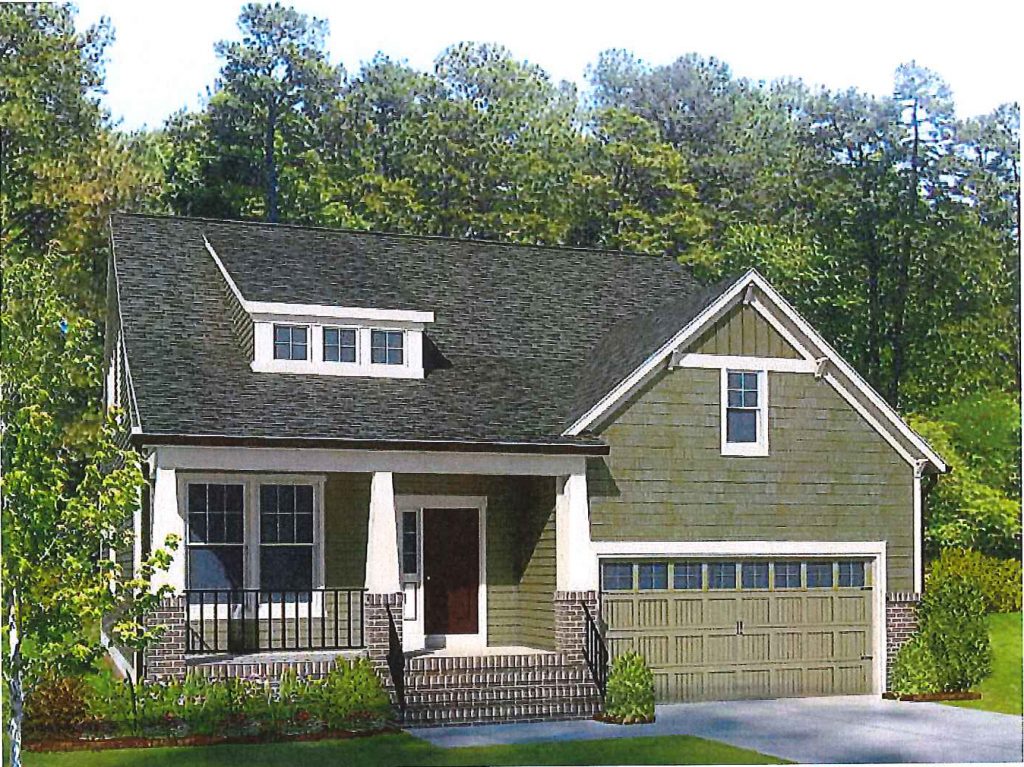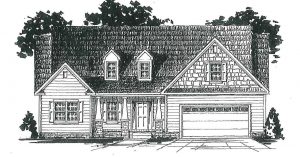
A proposed residential plan for Ashland calls for 103 single-family homes and 89 town houses. Images courtesy of Rogers-Chenault.
The developers behind a highly scrutinized proposal for nearly 200 homes in Ashland are going through with litigation they first threatened in February against the town and its board of zoning appeals.
The town was served with a lawsuit this month by Rogers-Chenault Inc. and Green Acres Associates LLC. The suit is seeking to require the town to fairly consider the proposed project, which has faced repeated setbacks related to concerns over density, aesthetics and a provision from a 30-year-old zoning plan.
The developers filed the suit four months ago in Hanover Circuit Court but agreed to put it on hold when the town asked for more time to work on the proposal.
That proposal currently calls for 192 homes on about 50 acres of vacant land between Chapman and Thompson streets, just west of the town’s central business district.
A requested rezoning to permit R-CI’s project, which would consist of 103 single-family homes and 89 townhomes, was scheduled for a hearing June 16 after the Town Council deferred a decision on it in May.
But at its June 2 meeting, council voted 4-1 to call off the hearing and directed the town attorney to resolve the rezoning request and related lawsuit. That decision came after the council consulted with legal counsel in an hour-long closed session.
The following week, the town was served with the lawsuit, which alleges the town’s staff violated state law by imposing a condition on the property’s development: specifically, a “life care retirement village” concept that was part of a proposed 1983 development called Green Acres. The retirement complex could include a dining hall, assisted living facilities and other features aimed at seniors.
The developers’ lawsuit says that provision was mentioned in, but was not required by, the 30-year-old zoning for the Green Acres proposal.
R-CI was not the developer on the 1983 plan but became involved a few years ago when it reached out to Green Acres Associates, the current property owner. The land is currently zoned for residential and business uses under the town’s planned unit development classification.
Todd Rogers, president and co-owner of R-CI Builders and an agent with Hometown Realty, has said his firm’s proposal is less dense than what could be built on the land by right, or under the current zoning.
Town staff has maintained the proposal does not conform to Ashland’s comprehensive land use plan, which calls for low-density, single-family residential in that area. The town planning commission cited that and other concerns when it recommended that council deny the rezoning request.
The board of zoning appeals, which is appointed by the circuit court and considered separate from the town, failed to affirm or deny the town staff’s decision when R-CI appealed it in January. R-CI then filed its lawsuit Feb. 4.
The lawsuit alleges unlawful and unauthorized local government action, deprivation of substantive due process, unlawful impairment of obligation of contract, inverse condemnation and taking action directly under the Virginia Constitution, and deprivation of vested rights. It also petitions for a writ of mandamus, which would order the town to reverse the staff decision.
The suit seeks a declaratory judgment, injunctive and other relief, and money damages and attorney fees.
Andrea Erard, Ashland’s town attorney, said discussions are ongoing between the town and R-CI regarding the latest proposal. Erard has 21 days to respond to the suit, which was served to her on June 12.
In a statement, Erard said: “In 1983 when the property that is known as Green Acres was rezoned, it is absolutely clear from the record that the land was rezoned for use as a retirement community, with options for varying levels of care. RCI does not want to build a retirement community, but rather single-family homes that are age restricted.
“Unfortunately, the Town of Ashland does not possess the authority to ignore the zoning that was approved in 1983.”
In the event that discussions do not reach an agreement, she said “the Town is prepared to argue in favor of the zoning action that was taken in 1983, and to require that the Green Acres property be developed as a retirement community.”
R-CI’s Rogers, who said he has met with town staff and council members at least 30 times since presenting the project a year ago, said he remains open to working toward an agreement.
“We’ve left the door wide open. If they still want to talk to us about some resolution, I’m available,” he said. “I’ve been available the whole time.”
Mayor George Spagna, who cast the lone dissenting vote against cancelling last week’s hearing, said he did so because he told R-CI that he would get the rezoning request on council’s agenda.
“Council overruled me,” Spagna said Monday. “I had told the developer I would get it on the agenda; council said no, they didn’t want it on the agenda, they weren’t prepared to vote.
“I would like to see us come to an agreement on how the property can be developed. I just don’t think we’re there yet.”

A proposed residential plan for Ashland calls for 103 single-family homes and 89 town houses. Images courtesy of Rogers-Chenault.
The developers behind a highly scrutinized proposal for nearly 200 homes in Ashland are going through with litigation they first threatened in February against the town and its board of zoning appeals.
The town was served with a lawsuit this month by Rogers-Chenault Inc. and Green Acres Associates LLC. The suit is seeking to require the town to fairly consider the proposed project, which has faced repeated setbacks related to concerns over density, aesthetics and a provision from a 30-year-old zoning plan.
The developers filed the suit four months ago in Hanover Circuit Court but agreed to put it on hold when the town asked for more time to work on the proposal.
That proposal currently calls for 192 homes on about 50 acres of vacant land between Chapman and Thompson streets, just west of the town’s central business district.
A requested rezoning to permit R-CI’s project, which would consist of 103 single-family homes and 89 townhomes, was scheduled for a hearing June 16 after the Town Council deferred a decision on it in May.
But at its June 2 meeting, council voted 4-1 to call off the hearing and directed the town attorney to resolve the rezoning request and related lawsuit. That decision came after the council consulted with legal counsel in an hour-long closed session.
The following week, the town was served with the lawsuit, which alleges the town’s staff violated state law by imposing a condition on the property’s development: specifically, a “life care retirement village” concept that was part of a proposed 1983 development called Green Acres. The retirement complex could include a dining hall, assisted living facilities and other features aimed at seniors.
The developers’ lawsuit says that provision was mentioned in, but was not required by, the 30-year-old zoning for the Green Acres proposal.
R-CI was not the developer on the 1983 plan but became involved a few years ago when it reached out to Green Acres Associates, the current property owner. The land is currently zoned for residential and business uses under the town’s planned unit development classification.
Todd Rogers, president and co-owner of R-CI Builders and an agent with Hometown Realty, has said his firm’s proposal is less dense than what could be built on the land by right, or under the current zoning.
Town staff has maintained the proposal does not conform to Ashland’s comprehensive land use plan, which calls for low-density, single-family residential in that area. The town planning commission cited that and other concerns when it recommended that council deny the rezoning request.
The board of zoning appeals, which is appointed by the circuit court and considered separate from the town, failed to affirm or deny the town staff’s decision when R-CI appealed it in January. R-CI then filed its lawsuit Feb. 4.
The lawsuit alleges unlawful and unauthorized local government action, deprivation of substantive due process, unlawful impairment of obligation of contract, inverse condemnation and taking action directly under the Virginia Constitution, and deprivation of vested rights. It also petitions for a writ of mandamus, which would order the town to reverse the staff decision.
The suit seeks a declaratory judgment, injunctive and other relief, and money damages and attorney fees.
Andrea Erard, Ashland’s town attorney, said discussions are ongoing between the town and R-CI regarding the latest proposal. Erard has 21 days to respond to the suit, which was served to her on June 12.
In a statement, Erard said: “In 1983 when the property that is known as Green Acres was rezoned, it is absolutely clear from the record that the land was rezoned for use as a retirement community, with options for varying levels of care. RCI does not want to build a retirement community, but rather single-family homes that are age restricted.
“Unfortunately, the Town of Ashland does not possess the authority to ignore the zoning that was approved in 1983.”
In the event that discussions do not reach an agreement, she said “the Town is prepared to argue in favor of the zoning action that was taken in 1983, and to require that the Green Acres property be developed as a retirement community.”
R-CI’s Rogers, who said he has met with town staff and council members at least 30 times since presenting the project a year ago, said he remains open to working toward an agreement.
“We’ve left the door wide open. If they still want to talk to us about some resolution, I’m available,” he said. “I’ve been available the whole time.”
Mayor George Spagna, who cast the lone dissenting vote against cancelling last week’s hearing, said he did so because he told R-CI that he would get the rezoning request on council’s agenda.
“Council overruled me,” Spagna said Monday. “I had told the developer I would get it on the agenda; council said no, they didn’t want it on the agenda, they weren’t prepared to vote.
“I would like to see us come to an agreement on how the property can be developed. I just don’t think we’re there yet.”
